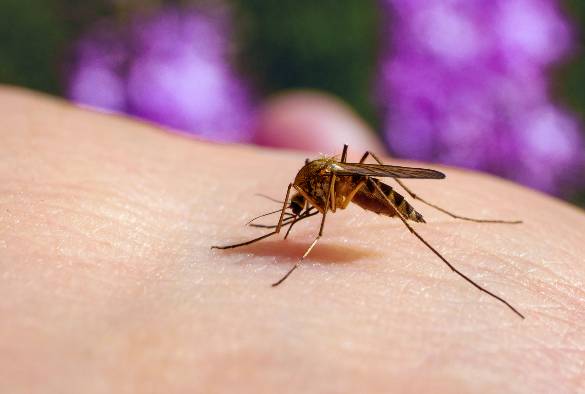New funding will enable scientists at the University of Liverpool to improve understanding of how changes in land use, climate and agriculture may increase the risk of diseases spread by ticks and mosquitoes to animals and humans in the UK.
Infections carried by ticks – including Lyme Disease as well as bacteria, parasites and viruses that can cause severe illness or death in livestock, are increasing in countries with previously milder weather. Meanwhile, climate change is also expected to make the arrival of mosquito-borne diseases such as West Nile Virus more likely in the UK in the next 30 years.
Two new projects being funded by UK Research and Innovation (UKRI) and Defra reflect a ‘One Health’ approach to vector-borne diseases, integrating animal, human and environmental health and sectors.
The projects are:
The first national surveys for Culex mosquitoes across England and Wales
These surveys will focus on two African viruses that have caused disease in humans and animals in northern Europe in recent years: West Nile virus and Usutu virus. Both viruses are transmitted by types of Culex mosquito – these include the common house mosquito, a native species found across the UK, and also certain invasive species.
To prepare for future disease outbreaks in people and/or animals, the researchers want to develop an understanding of the risk of virus transmission and how it may vary across England and Wales. Understanding this risk will enable us to identify years or areas of higher or lower risk and may enable the targeting of control measures.
This project will be led by the University of Liverpool’s Professor Matthew Baylis and Dr Marcus Blagrove in collaboration with the Liverpool School of Tropical Medicine, the University of Lancaster, UKHSA and the UK Centre for Ecology and Hydrology (UKCEH).
Professor Matthew Baylis said: “The people and animals of the UK are threatened by mosquito-borne diseases for the first time in several decades. Once complete, this project will put the UK in a much stronger position for addressing the threat of mosquito-borne viruses and tackling disease outbreaks if – and more likely ‘when’ – they occur in the future.”
Dr Marcus Blagrove said: “We already know that the UK has four mosquito species that transmit these viruses in Europe. What this project will determine is: the distribution of these species across the UK – where the risk is; and whether our climate is or will be warm enough for virus transmission – when the risk will be.”
The OPTICK project to mitigate the threat of tick-borne diseases
A multidisciplinary team of experts in ecology, epidemiology, economics, public and animal health, and social science, will work with land managers to jointly develop recommendations for policy and management, to mitigate the threat of tick-borne diseases.
The three-year, £1.25 million project is co-led by Dr Caroline Millins of the University of Liverpool and Dr Beth Purse of UKCEH. They will investigate how future changes in climate, national policies to expand woodland cover and areas for wildlife in and around farms, as well as animal density in the UK, will affect transmission of four tick-borne diseases across landscapes used for livestock grazing. Lyme Disease can cause long-term debilitating effects in people, while Louping ill disease, tick-borne fever and babesiosis can affect cattle and sheep production, are damaging to farmers’ livelihoods, and are considered a high priority for action by farming and veterinary organisations.
The team includes researchers and risk managers from the UK Health Security Agency (UKHSA), the UKCEH, the Animal and Plant Health Agency (APHA) and the Moredun Research Institute.
Dr Millins says: “OPTICK’s interdisciplinary One Health approach brings together for the first time policymakers, government organisations involved in animal, human and wildlife surveillance for tick-borne diseases from across the UK and stakeholders in land management, nature and farming to co-develop new models and risk maps and identify future priorities for surveillance.”
“Working closely with stakeholders and farmers in two hotspots for livestock tick-borne diseases in the southwest England and in Wales the project will develop new understanding of the environmental and management drivers of tick-borne pathogen transmission and disease outbreaks in areas grazed by livestock and will co-create cost effective solutions to reduce animal and human health burden from tick-borne diseases.”
Dr Purse and Dr Millins also co-lead the TICKSOLVE research project which investigates threats of tick-borne diseases to people in the UK.
Dr Purse explains: “There is an urgent need to establish the current distribution, economic burden and societal impacts of tick-borne disease in livestock, and identify gaps in surveillance. We will also analyse how land, health and livestock management and policies, as well as climate, can affect tick populations and the current and future risks of diseases being transmitted to livestock and people. Finally, we will identify the interventions that are most cost-effective and align with farming priorities and practice.”
The researchers will focus in particular on the tick species Ixodes ricinus, a key vector in the spread of infections, which is widely distributed and expanding in UK woodlands and agricultural land.
Defra Chief Scientific Advisor Professor Gideon Henderson said: “The funding for this important research, which brings together a wealth of expertise from some of the best scientific institutions in the UK, will continue to build and prepare the UK for the emergence of endemic and exotic tick-borne diseases.
“This coordinated scientific effort forms part of the UK’s commitment to work at the interface between environmental, human and animal health to improve outcomes for all.”
